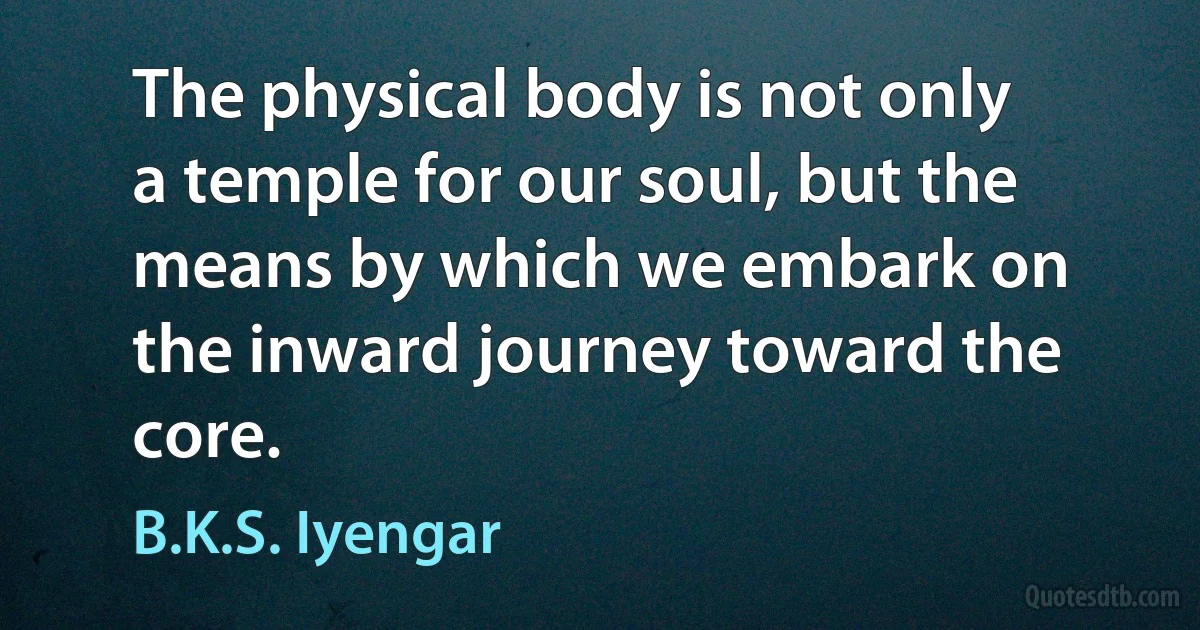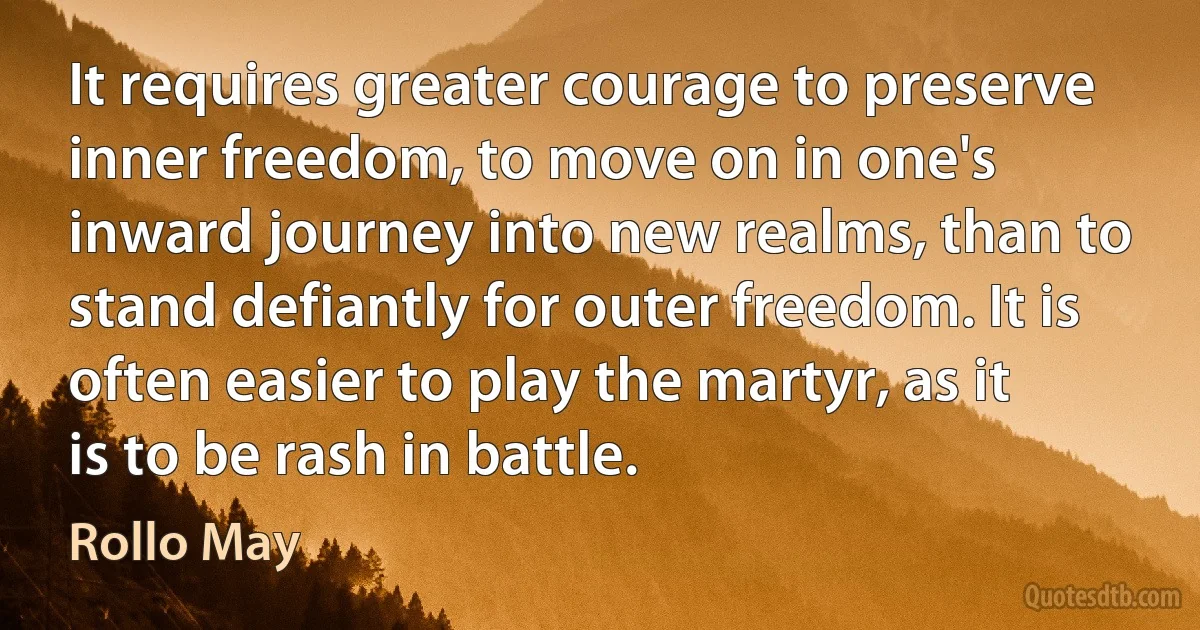Inward Quotes - page 3
There is nothing whatever in Existence but immediate and living Thought:-Thought, I say, but by no means a thinking substance, a dead body in which thought inheres,-with which no-thought indeed a no-thinker is full surely at hand:-Thought, I say, and also the real Life of this Thought, which at bot tom is the Divine Life; both of which-Thought and, this its real Life-are molten together into one inward organic Unity; like as, outwardly, they are one simple, identical, eternal, and unchangeable Unity.

Johann Gottlieb Fichte
Not only was he ignorant, but he had not even those conditions within himself which made knowledge possible. All that there was developed of him, at present, was a fund of energy, self-esteem, hope, courage, and daring, the love of action, life, and adventure; his life was in the outward and present, not in the inward and reflective; he was a true ten-year old boy, in its healthiest and most animal perfection. What she was, the small pearl with the golden hair, with her frail and high-strung organization, her sensitive nerves, her half-spiritual fibres, her ponderings, and marvels, and dreams, her power of love, and yearning for self-devotion, our readers may, perhaps, have seen. But if ever two children, or two grown people, thus organized, are thrown into intimate relations, it follows, from the very laws of their being, that one must hurt the other, simply by being itself; one must always hunger for what the other has not to give.

Harriet Beecher Stowe
Have not many of us, in the weary way of life, felt, in some hours, how far easier it were to die than to live?
The martyr, when faced even by a death of bodily anguish and horror, finds in the very terror of his doom a strong stimulant and tonic. There is a vivid excitement, a thrill and fervor, which may carry through any crisis of suffering that is the birth-hour of eternal glory and rest.
But to live, - to wear on, day after day, of mean, bitter, low, harassing servitude, every nerve dampened and depressed, every power of feeling gradually smothered, - this long and wasting heart-martyrdom, this slow, daily bleeding away of the inward life, drop by drop, hour after hour, - this is the true searching test of what there may be in man or woman.

Harriet Beecher Stowe
Among other men Reason awakes in another form-as the impulse towards Personal Freedom, which, although it never opposes the mild rule of the inward Instinct which it loves, yet rises in rebellion against the pressure of a stranger Instinct which has usurped its rights; and in this awakening it breaks the chains,-not of Reason as Instinct itself, but of the Instinct of foreign natures clothed in the garb of external power.

Johann Gottlieb Fichte
The Divine Existence (Daseyn),-his Existence, I say, which, according to the distinction already laid down, is his (Manifestation and Revelation of himself-is absolute- only through itself, and of necessity, LIGHT:-namely, y the inward and spiritual Light. This Light, left to itself, separates and divides itself into an infinite multiplicity of individual rays; and in this way, in these individual rays, becomes estranged from itself and its | original source. But this same Light may also again concentrate itself from out this separation, and conceive and comprehend itself as One, as that which it is in itself,-the Existence and Revelation of God; remaining indeed, even in this conception, that which it is in its form,-Light; but yet in this condition, and even by means of this very condition, announcing it-to self as having no real Being in itself, but as only the, Existence and Self-Manifestation of God.

Johann Gottlieb Fichte
The Doctrine of a Perfect God; in whose nature nothing arbitrary or changeable can have a place; in whose Highest Being we all live, and in this Life may, and ought at all times to be, blessed;-this Doctrine, which ignorant men think they have sufficiently demolished when they have proclaimed it to be Mysticism, is by no means Mysticism, for it has an immediate reference to human action, and in deed to the inmost spirit which ought to inspire and guide all our actions. It can only become Mysticism when it is associated with the pretext that the insight into this truth proceeds from a certain inward and mysterious light, which is not accessible to all men, but is only bestowed upon a few favourites chosen from among the rest:-in which pretext the Mysticism consists, for it betrays a presumptuous contemplation of personal merit, and a pride in mere sensuous Individuality.

Johann Gottlieb Fichte
Through a marvelous law of natural compensation, he who gives of himself grows, and he who turns inward and lives from small pleasures, is afraid to share them with others, and only thinks avariciously of cultivating his appetites loses his humanity and becomes loneliness itself. He carries in his breast all the dreariness of winter. He becomes in fact and appearance an insect.

José Martí
[Y]ou have expressed my inward conviction, though far more vividly and clearly than I could have done, that the Universe is not the result of chance. ... Lastly, I could show fight on natural selection having done and doing more for the progress of civilization than you seem inclined to admit. Remember what risk the nations of Europe ran, not so many centuries ago of being overwhelmed by the Turks, and how ridiculous such an idea now is! The more civilized so-called Caucasian races have beaten the Turkish hollow in the struggle for existence. Looking to the world at no very distant date, what an endless number of the lower races will have been eliminated by the higher civilized races throughout the world.

Charles Darwin
Most people define learning too narrowly as mere 'problem-solving', so they focus on identifying and correcting errors in the external environment. Solving problems is important. But if learning is to persist, managers and employees must also look inward. The need to reflect critically on their own behaviour, identify the ways they often inadvertently contribute to the organisation's problems, and then change how they act.

Chris Argyris
What the virtues are to existential perfection, truths are to intellectual perfection; virtue is essentially simplicity, inward beauty, generosity, whereas truth, for its part, lies entirely in the discernment between the Real and the illusory or between the Absolute and the contingent.

Frithjof Schuon
This morning the music of a brass band which had stopped under my windows moved me almost to tears. It exercised an indefinable, nostalgic power over me; it set me dreaming of another world, of infinite passion and supreme happiness. Such impressions are the echoes of Paradise in the soul; memories of ideal spheres whose sad sweetness ravishes and intoxicates the heart. O Plato! O Pythagoras! ages ago you heard these harmonies, surprised these moments of inward ecstasy, - knew these divine transports! If music thus carries us to heaven, it is because music is harmony, harmony is perfection, perfection is our dream, and our dream is heaven.

Henri-Frédéric Amiel



